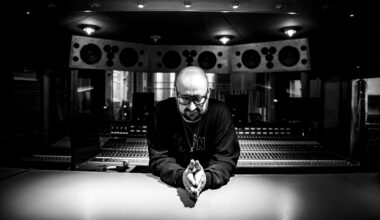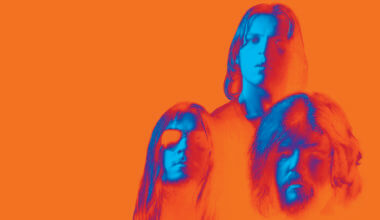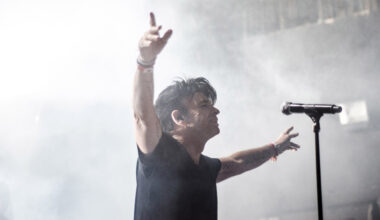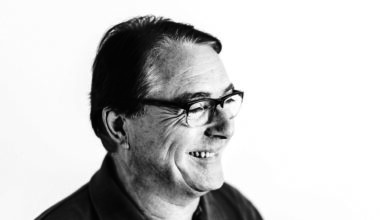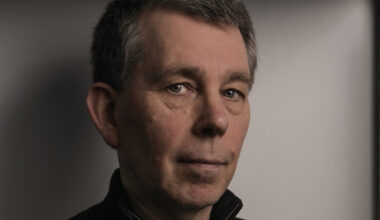While her work at the BBC is well documented, she remains an enigmatic figure. We join Radiophonic Workshop veterans, Dick Mills and Roger Limb, who offer a glimpse into the more personal side of Delia Derbyshire
Once upon a time, at the BBC Maida Vale Studios in London, there lurked a group of musical boffins who surreptitiously warped the minds of the nation’s children. Up in Room 13, above a converted ice rink, these sonic adventurers introduced post-war Britain to strange electronic noise for the first time. The Radiophonic Workshop was set up in 1958, an experimental appendage to Auntie’s light music department, hidden away in a pokey room on the Delaware Road, which most BBC employees knew nothing about. As for the public, they were completely oblivious that they were being fed the purest musique concrète via the backdoor, initially in the form of radio plays and later in the shape of TV shows like ‘Doctor Who’.
With dramas and school programming, and eventually a miscellany of other shows needing added synthetic realism, television broadened the scope of what the Workshop was allowed to do. The input of the department on children’s programmes in particular presented remarkable possibilities. Utilising a raft of sonic ideas that had never been tried before, the sounds of the Radiophonic Workshop would become entirely natural to a whole generation of kids.
Oxbridge graduate Delia Derbyshire saw the possibilities of the Radiophonic Workshop before the BBC had even figured out what it was for, and transferred to the unit from her trainee assistant studio manager’s job in 1962 after two years with the Corporation. Derbyshire would observe the department in her spare time in the hope she’d one day get her hands on some magnetic tape.
Decca had turned Derbyshire down in 1959 after she left university, informing her that sound engineering wasn’t suitable work for a woman. Along with Daphne Oram and Maddalena Fagandini, she would prove them wrong, going on to help break new ground in sound at the Radiophonic Workshop, a non-discriminatory employer in an era before equal opportunities. However, Workshop employees weren’t considered musicians, and certainly not artists, they were engineers and technicians first and foremost.

“We were purveyors of a service,” says Workshop mainstay Dick Mills, who joined in 1958. Mills worked alongside Derbyshire as a technical assistant, helping with her tasks and sticky tape until she left the BBC in 1973. “We weren’t just doing it to please ourselves as many, what I’d call, genuine composers do. It was more a case of, ‘We need this by next Tuesday, can you do something?’. Working out other people’s ideas was a godsend, actually.”
The technology was so new that the BBC feared overexposure might cause mental instability in its employees. Inchoate sound manipulation was crude, but it worked effectively enough that the Radiophonic Workshop soon became indispensable.
“A lot of the commissions only came in towards the end of production, just before transmission,” says Mills, “so while we appreciated our customers, we also realised that it was often a last-minute idea and they desperately wanted something that would save their programme. We were dealing with unknown flavours and sounds and ideas, most of them of a creative nature that nobody had heard before, so we were on to a win-win.”
“What you have to remember is that the Radiophonic Workshop began almost by accident, and the management had trouble acknowledging that we composed music,” says Roger Limb, Mill’s colleague from 1972 onwards, who also worked with Delia during her final year at the BBC. “At first it was sound manipulation. The word ‘music’ didn’t creep in for quite a while.”
“You certainly wouldn’t go whistling it down the street!” adds Mills.
Mills and Limb are two of the most genial gentlemen you could hope to spend an afternoon drinking coffee with. Limb, whose booming BBC voice is like a warm bath (he moonlighted as an announcer in the 1970s) asks for a latte. Mills, who retains an estuary accent untouched by received pronunciation, says he’s more of a Nescafé man. In the recorded interviews that survive of Delia Derbyshire, she speaks with clipped tones, but she grew up in Coventry with a father who was a sheet metal worker in what she described as an “upper working class Catholic background”. Born in 1937, her formative years were during the Blitz, and she would later come to ponder upon whether her love of abstract sound came from air-raid sirens.
“When she went to Cambridge and certainly at the BBC, she ironed out her Coventry drawl,” says Limb. “But what was quite interesting was that when she got excited or cross…”
“… or drunk,” interjects Mills.
“… she would lapse back into Coventry again.”
Derbyshire won a scholarship to study mathematics at Girton College, Cambridge, though she changed her course after a year to incorporate medieval and modern music history. It’s often been said that Delia Derbyshire was more mathematician than musician.
“Oh yes, she was,” concurs Mills, “she was an academic, primarily.”
Mills remembers the department’s mid-monthly meetings, taken by Workshop head Desmond Briscoe. It being the BBC, Briscoe once apparently called everyone into the room to inform them there was no news.
“Typical civil service,” says Mills.
During one of those meetings, Derbyshire was looking fixedly over Briscoe’s shoulder at the wall and interrupted proceedings by shouting “You’ve got it!”. Mills relates the back and forth…
“So Desmond said, ‘Oh, that’s very nice to know’, and Delia said, ‘No, you’ve got it!’. And Desmond said, ‘Well, I think we’re all wondering what you mean, Delia’. And then she got up and grabbed this book off the shelf, a dissertation by some mathematical professor on the relationship between frequencies or something. So she sat down and started reading, saying, ‘No, that’s wrong’ and she went all the way through this book discovering things in it that weren’t right. She was that particular.”
Single-mindedness was an asset in the unpredictable world of nascent sound manipulation, especially with temperamental equipment that could break just as inspiration was striking. With deadlines approaching, a shift through the night accompanied by some cheap, imported Moroccan red became part of the culture at the Workshop.
“I used to ring up my missus sometimes,” chuckles Mills, “and say, ‘I’ve had a fantastic day, everything is going right, I’m buzzing, everything I seem to touch is going well, and I’d rather stay here an extra couple of hours to get the bulk of it done’. It was a bit like surf riding, as long as you had the wave of creativity and ability underneath, you could go on forever.”
As a result, Derbyshire would often be found at her desk asleep when employees turned up in the morning, empty wine bottle at her feet.
“And often she had a habit of sleeping against the door so you couldn’t get in,” says Mills.

Some of these stories seem at odds with the elegant mythological figure that has been conjured by the 21st century imagination more than informed by fact.
“Her name sounds rather exotic and she looked exotic when you met her,” says Limb. “Kind of tall and Pre-Raphaelite.”
The ‘Doctor Who’ theme took between 10 days and a fortnight to assemble. Clearly Dick Mills had no idea it would become one of the most recognisable theme tunes in British television history, or that it would still be repeated now during Saturday night peak-time viewing some 55 years later.
“It was just something we were doing that week, me and Delia,” he shrugs.
The story is a familiar one: Ron Grainer annotated the score on a piece of paper before heading off on holiday. Derbyshire then set about its creation with three tape recorders, plenty of persistence and more than a touch of genius. Grainer came back from Portugal a few weeks later and, amazed by the results, asked, “Did I write that?”. “Most of it,” Derbyshire is said to have replied.
Lesser known is the story of the commission: Mills and Briscoe met with TV producer Verity Lambert at Ealing Studios, who told them the BBC had a new children’s show with an unusual modus operandi, where the young audience would be frightened one week, and taught something the following week. Or as Mills puts it, “Crap yourself one week and learn something the next whether you liked it or not”. Lambert apparently asked for “a bloody good signature tune” and Briscoe suggested Grainer, who’d recently scored a programme called ‘Giants Of Steam’ featuring a rhythm track from the sound of some piston engines that ran behind a group of live musicians on a loop.
“Verity didn’t think ‘Doctor Who’ would last much longer than a few months,” adds Mills.
In the years before multi-track, the pair had to make do with three quarter-inch tape machines with a little device that would start them simultaneously, although Mills and Derbyshire didn’t know about said device until much later.
“You used two arms and a leg,” says Mills, laughing. A fourth tape machine recorded the other three, “a wonderful recipe for tape hiss” recalls Limb. In this experimental culture, employees got to figure out their own working methods. Mills came to understand Derbyshire’s eccentric ingenuity, but he wouldn’t necessarily have a clue how other engineers worked. The doyen of the magnetic tape, John Baker, an engineer who could effortlessly splice structural rhythmic feel into his compositions, would have had a completely different set-up to Derbyshire, whose way of working even had its own name: The Delian Mode.
“Delia would have had experience twanging a steel wire from making other shows,” says Limb. “So she had a repertoire of things that she thought would have worked for Doctor Who.”
And then there was her famous lampshade, an industrial enamel green lamp with a white interior that hung in schools everywhere.
“She was a great one for making music out of everyday things,” says Mills.
She was also meticulous where detail was concerned, and once called up David Attenborough in search of the cry of a lemur from Madagascar for a montage she was making. As luck would have it, Attenborough found a tape of the creature in his loft and mailed it to her.
“She could have got a recording of any animal and manipulated it to make an outlandish sound and everyone would have believed it was a lemur,” says Mills. “But she wanted the real thing.”
Derbyshire’s absolute focus could also get her into trouble. While riding her bike in Camden one day, she became so engrossed in deep thought that she suddenly found herself miles from home.
“That’s right,” recalls Mills. “She said to me, ‘I ended up in Vauxhall last night’ and I said, ‘What for?’ and she said, ‘I don’t know. I started cycling and something was going through my mind’. She was probably thinking about her lampshade.”
If her eccentricity was legendary then so were her soirées.
“She threw the odd party,” says Mills.
“Very odd parties,” says Limb. “She had the odd boyfriend too, and some of them were odd an’ all.”
“There was the guy who thought he was a saint,” offers Mills. “He lived in an alcove halfway up her stairs.”
While Derbyshire was clearly unusual, Mills’ wife enjoyed her company and thought she was “down to earth”. “My wife hated the dreaded BBC party,” he says, unless Derbyshire attended with her. Limb’s experience was of someone more quirky than ordinary.
“She came round to my house once and my wife had prepared supper and she met all the kids who were very interested,” he recalls. “Delia walked in and started walking around the living room. I said, ‘Have a chair, Delia’, and she said, ‘Oh, I can’t sit down until I’ve got to know the room’. Funny little things like that.”
Another time, when Limb was broadcasting on air in the 70s, Derbyshire called the switchboard and was put through to him in downtime between programmes. “Roger, have you shaved your beard?” she asked. “As a matter of fact I have,” he replied, astonished. He asked her how she knew. “I can just tell by listening to the sound of your voice”.
Mills and Limb go on to list addresses between themselves where Derbyshire had lived for short periods of time: a garden flat in Bayswater, somewhere in Swiss Cottage, a flat over the greengrocers at Clifton Villas, a tent in the bottom of David Vorhaus’ garden…

“She was a free spirit,” says Mills. The pair got to know her well over the years, and while they’re somewhat mystified by the mythology that has grown up around her, mostly since her death in 2001, they do understand it.
“People look upon Delia as a feminist icon now,” says Mills, sounding slightly baffled.
“There was a kid’s TV series about famous inventors presented by Dick and Dom,” says Limb, disparagingly. “It was weird because they had this animated face of Delia with the mouth moving up and down as she spoke, and I just thought, ‘Oh, God’.”
If she’s become a cult icon in death, then she did, at least, accrue some kudos while still alive, especially among forward-thinking musicians who beat a path to her door: Paul McCartney, Brian Jones and Anthony Newley are all mentioned.
“And all these people came to consult with her because she had become famous in the world of electronic music,” says Roger. “Now, I don’t know whether any of these consultations were successful or not. I expect not because this was a kind of fame she didn’t want.”
In 1971, the Institute of Electrical Engineers celebrated 100 years at a gala at the Royal Albert Hall attended by the Queen. Derbyshire had been commissioned to write a piece of music for the event.
“She did a soundtrack for the opening graphics,” says Mills. “And Brian [Hodgson] sensibly took a copy.”
The copy was made covertly, and on the morning of the performance, Derbyshire told her colleagues the tape had been destroyed. Hodgson played his hand and Derbyshire apparently hit the roof.
“She threw a wobbly!” laughs Mills. “I mean, she never basked in any adulation.”
Derbyshire was even invited to guest on a Roy Harper album recorded at Abbey Road Studios in the early 70s. While she’d consulted with Peter Zinovieff in the creation of the VCS 3 synthesiser down in Putney, she was ambivalent about synths themselves, feeling she was unable to “get inside” them. When Limb arrived at the Workshop, the technology and the culture within the organisation was changing and Derbyshire’s days were numbered. As for Abbey Road, she asked Limb to go along and set up the synth as she wasn’t sure how to.
“I went along and set it up and she was…” Limb pauses. “She didn’t try to take the limelight away from me or anything like that, but she was obviously the star and I was her assistant. I set it up for Roy Harper and he played it, but it was the old scenario of ‘Let’s get Delia Derbyshire on board because she’s got this reputation’.”
Much of that reputation came from her work on the remarkable ‘Doctor Who’ theme tune, which after a while seemed to take on a life of its own. While the music had originally been attributed to Ron Grainer and the Radiophonic Workshop, Derbyshire finally got a posthumous credit in 2013. Whether this would have pleased her is impossible to say, though as an artist she was far more interested in the process than the finished result.
“In my evaluation, Delia was a traveller, not an arriver,” says Mills. “She enjoyed the journey far more than the destination. There was never any hesitation, she knew exactly how it was going to sound in her mind and she worked towards that conclusion. But, and this sounds silly, because she knew how it finished she couldn’t care less if it got finished or not.”
According to Louis Niebur’s book ‘Special Sound: The Creation And Legacy Of The BBC Radiophonic Workshop’, she suffered from “reverse adrenaline”, where the more the pressure mounted, the slower she’d work. Often projects would begin with a flurry and grind to a standstill as deadlines loomed.
“Desmond used to say to me, ‘Are you busy?’,” says Mills. “And I’d say, ‘Not really, why?’. He’d say, ‘Go and help her finish that bloody programme’. Her enthusiasm was exponential, but downwards. Once she’d got through all the research, planning, after the mundane process of putting it together, she went off the boil.”
“I saw a bit of this when I went into the Workshop,” concurs Limb. “Desmond would say, ‘Can I ask you to help Delia, she has a deadline coming up relating to a film about Egypt’ or something. She already had most of the sounds prepared.”
Roger would leave her in the evening in anticipation of dubbing the programme in the morning, then would go to work the next day and discover she’d been tinkering until 2am.
“‘I’ve changed one or two things’,” she’d say. Half of me understands that,” says Limb, “but if you’re at the sharp end of broadcasting, it’s a case of getting it done.”
Get the print magazine bundled with limited edition, exclusive vinyl releases



If the beginnings of the Workshop had been clandestine and avant-garde, then in the 70s it took a more overt tonal direction with the arrival of composers like Limb and Paddy Kingsland, while the introduction of keyboards confounded the old guard of constructionists such as Derbyshire, Baker and David Cain.
“By the time I met Delia it was 1972, and she had come to a point where she wasn’t working as excitedly as she had been,” says Limb, diplomatically. “She wasn’t resting on her laurels, but she’d always been a little eccentric, always been a little bit off-centre, which means she was very successful. But she couldn’t cope with change, and change was in the air.”
“I couldn’t imagine someone joining the BBC now and working as she did. It’s a reflection on what the place was like in the early 60s. They would take risks, they would allow experiments. And a person like Delia, who was eccentric but brilliant in her own way, I doubt there would be room for her at the current BBC.”
Derbyshire sadly died from alcohol-related cirrhosis of the liver aged 64 in 2001. What role did drinking culture at the time have to play in her decline at the Radiophonic Workshop?
“I dunno really,” says Mills, philosophically. “You could blame it on the fact that we were allowed to work unlimited hours. This really harked back to the old offices. You go in bursting with ideas and the machines don’t work properly. Or you go in and the machines are perfectly aligned and you haven’t got an idea in your brain. So the manager took the realistic view that there’s no point in you coming in if you can’t achieve anything.”
The engineers often worked throughout the night. There were no supervisors and the canteen wasn’t open.
“So you might take a bottle of wine in with you to keep you going. And it’s very easy to take a sip every time you pass it. And it builds up and you set yourself a habit and before you know it you’re dependent on it.”
Mills says John Baker used to go down to the pub every lunchtime, and there were times where they caught him drinking out of a brown paper bag.
“Delia too,” says Limb. “I went to a concert with her and out came the bottle in the brown paper bag. We’ve all been in that situation.”
“I don’t think it affected her talent or her musical choices or judgement,” says Mills, “I think it just slowed her down.”
“It narrowed her horizons too,” adds Limb. “She would go back and rehash the library of sounds she had rather than look for new sounds.”
Speaking of new sounds, electronic music is everywhere now. Is that the Radiophonic Workshop’s legacy?
“It is to our credit, or to our shame depending on who’s asking the question, that we’ve educated youngsters to accept a new artform,” says Mills.
For details of Delia Derbyshire Day events, visit deliaderbyshireday.com


